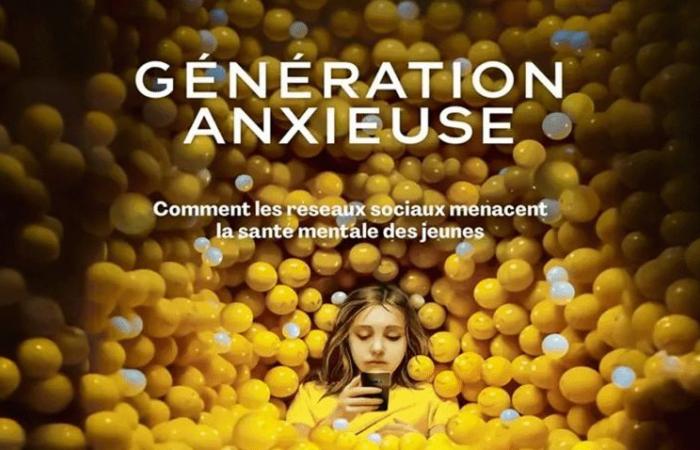Between 2010 and 2015, the emergence of smartphones and social networks transformed the lives of adolescents, marking what Jonathan Haidt calls in his new book Generation Anxiety the “Great Recalibration”. This technological shift, at the origin of the first generation to have gone through puberty with their eyes glued to their screens, coincides with a skyrocketing rise in mental disorders: anxiety, depression, self-harm and suicide. The impact of this phenomenon goes beyond borders and also affects all Western countries.
A generation in pain: the figures of a silent crisis
Since the early 2010s, rates of depression and anxiety have exploded, particularly among girls. Non-lethal self-harm among American teenagers tripled between 2010 and 2015. Suicide rates doubled. These trends are not isolated: the same alarm signals are appearing in Canada and in Europe.
We were unable to confirm your registration.
Your registration is confirmed.
Dating is not anecdotal, it corresponds to the appearance of new social networks, Instagram, TikTok, Whatsapp and the inflection of the curves of the mental health of our children is unmistakable, it is dizzying and not in a good way . 15 years during which technology companies behaved like the tobacco industry, and whose products are highly addictive.
The four fundamental damages of digital childhood
Jonathan Haidt identifies four destructive mechanisms that explain why the mass adoption of smartphones has had such a devastating impact.
- Social deprivation : Between 2012 and 2019, the time teens spent with their friends face-to-face fell by 45%. Digital interactions, often asynchronous and superficial, do not replace real connections, necessary for the development of social and emotional skills.
- Lack of sleep : The omnipresence of screens disrupts the circadian rhythm of young people. Nighttime notifications and prolonged smartphone use lead to a decline in the quality and quantity of sleep, exacerbating mood disorders and associated cognitive difficulties.
- Fragmentation of attention : Teenagers are bombarded with hundreds of notifications every day, reducing their ability to focus on a task for more than a few minutes at a time. This cognitive dispersion slows down the development of executive functions, crucial for decision-making and problem solving.
- Behavioral addiction : Social media leverages dopamine-boosting techniques, similar to those used in slot machines, to maximize engagement. This conditioning leads to addiction, worsening anxiety and irritability.
Social networks, designed to capture attention, affect girls more for several reasons:
- Increased social comparison : Adolescent girls are particularly sensitive to the standards imposed by visual platforms, fueling toxic perfectionism.
- Cyberaggression : Unlike boys, who express their aggression in physical ways, girls often use social media for targeted reputation-damaging attacks.
- Sociogenic influence : Negative emotions circulate more quickly among hyperconnected adolescent girls, amplifying psychological disorders.
- Exploitation and harassment : Girls are also more exposed to inappropriate online solicitations, accentuating their feeling of vulnerability.
For boys, the impact manifests itself differently. Video games and online pornography provide outlets that limit their engagement in the real world. About 7% of boys develop a problematic gaming addiction, which deteriorates their mental and physical health, family relationships and academic success. The transition to adulthood becomes more difficult, with some falling into chronic inactivity, described as a phenomenon NEET (Not in Education, Employment, or Training).
A collective responsibility: parents, schools, governments, businesses
Jonathan Haidt points to shared responsibilities in this crisis:
-- The parentsinfluenced by a growing cult of safety since the 1990s, limit children's autonomy, depriving them of essential opportunities to learn to manage risks and develop.
- Schools were unable to establish effective rules to regulate the use of smartphones, allowing them to interfere with learning and social relationships.
- Governments remain passive in terms of regulating digital platforms, allowing algorithms to capture the attention of young people without safeguards. However, countries like Australia, which has just passed a law banning social networks for under 16s, are starting to take action.
- Technology companies exploit adolescents' psychological vulnerabilities to maximize their engagement, with a real lack of consideration for long-term consequences.
The urgency to act
Faced with this situation, Jonathan Haidt offers several concrete solutions to reverse this trend:
- Ban smartphones at school : A strict policy should exclude smartphones from educational establishments, with the exception of their educational use under supervision.
- Promote free play : Children must find spaces to play without excessive supervision, develop their autonomy and strengthen their resilience.
- Regulating digital access : Delay the introduction of smartphones until high school and establish periods without screens in homes.
- Strengthen regulations : Inspired by the Children’s Code In Britain, governments could impose specific protections for minors online and set the age of digital majority at 16.
By questioning the educational, technological and cultural choices of the last decade, Generation Anxiety paints an uncompromising portrait of a generation in search of balance. A very well documented book, which allows you to better understand the ins and outs of the situation, and suggests actions to take individually in the hope that the collective wins.
Generation Anxiety is the book for this 2025 school year to read, you can find it in all good bookstores. Happy reading!
Jonathan Haidt, born in 1963 in New York, is a social psychologist and professor of ethics. A specialist in moral issues, he taught at the University of Virginia (1995-2011) before joining the Stern School of Business at New York University. Author of several notable works, including The Happiness Hypothesis (2006), The Righteous Mind (2012) et The Coddling of the American Mind (2018), he is among the “great global thinkers” according to Foreign Policy and the world's leading intellectuals for Prospect. His TED conferences have millions of views.
The latest articles by Richard Menneveux (see all)







